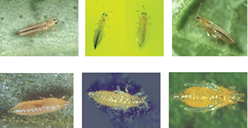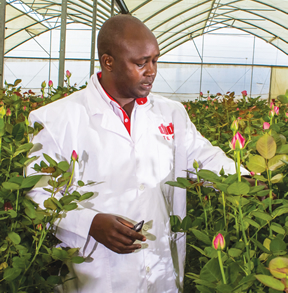The idea that “Climate science is settled” runs through today’s popular and policy discussions. Unfortunately, that claim is misguided. It has not only distorted our
Category: Featured Articles (Nov – Dec 2014)
 About two million Kenyans are food insecure. In Nairobi, up to 20 per cent of the population is ultra hungry, researchers tell us. Farmers responsible for feeding the country are still struggling with access to seeds, government subsidized agro inputs, diseases and pests and emerging threats like climate change.
About two million Kenyans are food insecure. In Nairobi, up to 20 per cent of the population is ultra hungry, researchers tell us. Farmers responsible for feeding the country are still struggling with access to seeds, government subsidized agro inputs, diseases and pests and emerging threats like climate change.
Ironically Kenya is endowed with large swathes of green fertile land, favourable climate and a highly entrepreneurial population with institutions like the Food and Agricultural Organisation classifying the country’s land as so verdant, so lush and so capable of generating food that it could, alone, be the agricultural supply station for most of Africa. The World Bank on the other hand through numerous studies shows Kenyan farmers among the most important in developing countries capable of creating a trillion-dollar food market by 2030 if they expanded their access to more capital, better technology, irrigated land and grow high-value nutritious foods.
SoliQ Air, a specialist high performance flower packaging product has established its global roots into the Kenya Flower sector in just a little under two
 Thrips, order Thysanoptera, are tiny, slender insects with fringed wings. They feed by puncturing the epidermal (outer) layer of host tissue and sucking out the cell contents, which results in stippling, discolored flecking, or silvering of the leaf surface. Thrips feeding is usually accompanied by black varnishlike flecks of frass (excrement).
Thrips, order Thysanoptera, are tiny, slender insects with fringed wings. They feed by puncturing the epidermal (outer) layer of host tissue and sucking out the cell contents, which results in stippling, discolored flecking, or silvering of the leaf surface. Thrips feeding is usually accompanied by black varnishlike flecks of frass (excrement).
Pest species are plant feeders that discolor and scar leaf, flower, and fruit surfaces, and distort plant parts or vector plant pathogens. Many species of thrips feed on fungal spores and pollen and are often innocuous. However, pollen feeding on plants such as orchids and African violets can leave unsightly pollen deposits and may reduce flower longevity. Certain thrips are beneficial predators that feed on other insects and mites.
 The crop protection industry is dominated by the large multinational agro-chemical companies such as Syngenta, Monsanto and Bayer Cropscience. The biocontrol business is minute in comparison, with only 3% of global sales of crop protection products. The future of the biocontrol industry is based on a range of interacting factors and difficult to predict the future, however many are suggesting that its future is likely to grow. There are numerous drivers for the use of biological control.
The crop protection industry is dominated by the large multinational agro-chemical companies such as Syngenta, Monsanto and Bayer Cropscience. The biocontrol business is minute in comparison, with only 3% of global sales of crop protection products. The future of the biocontrol industry is based on a range of interacting factors and difficult to predict the future, however many are suggesting that its future is likely to grow. There are numerous drivers for the use of biological control.
Pesticide resistance.
Whether a pest or a disease, most organisms have the ability to become resistant to a large range of pesticides. This is often seen in the field where one season a particular pesticide works well and later the efficacy is not there. Resistance has been reported in many common groups of insecticides and fungicides.
 Briefly discuss Barnaba Rotich (Background-Personal and a professional)
Briefly discuss Barnaba Rotich (Background-Personal and a professional)
My love for farming started way back when I was a little kid. I was raised in a farm and as I was growing up I enjoyed playing with farm machineries and had fun during agricultural classes throughout primary and secondary school. So I was delighted when I got admitted to JKUAT to pursue a Bsc. Degree in Horticulture.
In December 2001 I did my last exam on a Friday and started work with Dudutech the following Monday and within one year I got promoted from Field Trials Officer to a Production Manager in charge of one line of insects and thereafter to the position of Production Coordinator in charge of all insect production lines. By March 2005, I was seconded to Dudutech’s sister company in South Africa to set up one of the biggest IPM projects in the Southern Africa at the time. I came back to Kenya after one year stint and took a new role as Technical Manager again in insect production and got promoted to Commercial &Technical Sales Manager a position I have been for 5 years.
This success has been attributed to many factors, key among them being the favourable climatic conditions around the equator, availability of educated and resourceful workforce,
Electricity cost is one of the key expenses in any flower farm. With the fuel component playing a crucial role in determining each month’s charge
In spite of signing the delayed Economic Partnership Agreement (EPA) alongside its East African Community counterparts, Kenya will still have to pay Sh600 million more
Arysta LifeScience announced that Platform Specialty Products has reached a definitive agreement with a company backed by the Permira funds to acquire Arysta LifeScience for
